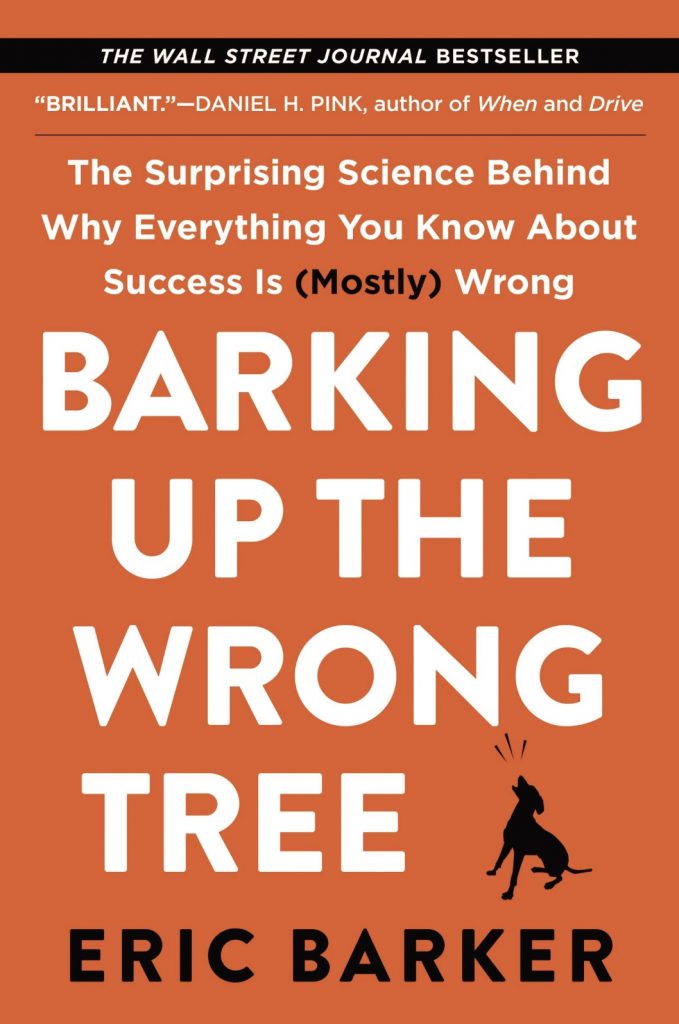Key Quote:
“Successful people may sacrifice everything they have in order to achieve their goals, but they must be careful. Having a calling one is obsessively passionate about can bring success and fulfillment, but it can also crowd out relationships, which are key to happiness” (pp. 210-218). — Eric Barker
Key Points and Concepts
Should We Play It Safe and Do What We’re Told If We Want to Succeed?
Many high school valedictorians go on to be strong occupational achievers with stable careers, but not to change, run, or impress the world. What makes students successful in the classroom is the same thing that makes them less likely to do extraordinary things outside the classroom. Schools reward being a generalist, whereas in the outside world, passion and expertise are more rewarded (pp. 9-10).
Leadership Filtration Theory:
Filtered leaders: Rise up by following the rules and meeting expectations (p. 12)
Unfiltered leaders: Have more unconventional and unpredictable paths, they are entrepreneurs and thrive in a perfect storm of events (p. 12) Unfiltered leaders often have unique qualities or intensifiers. “These qualities are often negative at the mean […] but due to the specific context, they [become] positives” (p. 14).
• Neville Chamberlain was a prototypical British prime minister who followed a typical path and “did everything right.” In contrast, Winston Churchill was an atypical British prime minister who was elected to parliament at a young age and whose intensifier, his zealotry and paranoia towards Hitler, was exactly what Britain needed heading into World War II (pp. 11-12).
Your intensifiers can make or break you depending on the environment you are in. “Most people are dandelions; they’ll come out okay under almost any circumstances. Others are orchids; they’re not just more sensitive to negative outcomes, but more sensitive to everything. They won’t flourish in the dirt by the side of the road like a dandelion would. But when they’re well-tended in a nice greenhouse, their beauty will put the dandelions to shame” (p. 18).
How to use Leadership Filtration Theory to be more successful in life:
Know thyself: If you’re a filtered leader and you do best by playing by the rules, stick to that. If you’re an unfiltered leader, don’t try to comply with structure, play to your intensifiers (p. 27).
Pick the right pond: Find an environment where your talents, abilities, and biases are aligned with what produces success in that environment (p. 29).
Do Nice Guys Finish Last?
There are three types of people:
• Givers: Consistently look to help others
• Matchers: Even balance of give and take
• Takers: Take more and give less
Givers can be found at the top and the bottom of most metrics of success while the middle is populated by the Matchers and Takers. Takers experience short-term benefits, but inherently nobody wants to help them. Givers receive help from other Givers, and have their actions rewarded by Matchers (pp. 44-45).
Researchers programmed algorithms to behave with different levels of trust and cooperation to participate in a game where those values are at stake. The following outcomes were recorded:
• The most successful program was ‘Tit for Tat’ (TFT) which cooperated on its first turn, then copied its opponent’s behavior on subsequent
turns (following cooperation with cooperation and betrayal with betrayal (p. 50).
• “ Generous Tit for Tat,” which occasionally forgave its opponent’s last move of betrayal, was the only program to be even more successful (p. 52).
Four lessons learned from TFT’s success:
• Don’t be envious: Someone else winning does not mean you lose (p. 54)
• Don’t be the first to defect: Reciprocity is important, but it is essential you give first (p. 54)
• Reciprocate both cooperation and defection: Be nice, but if you’re cheated, retaliate (p. 55)
• Don’t be too clever: TFT was the simplest program of the bunch (p. 55)
Do Quitters Never Win and Winners Never Quit?
Gritty people are optimistic and can engage in positive self-talk rather than indulging in a helpless, pessimistic attitude. Optimism is all about the stories you tell yourself about the world in terms of permanence, pervasiveness, and personalization (pp. 67-71).
Gritty people create stories to filter an often-chaotic world and create meaning for their life. You can create meaning in your life by distinguishing between your ‘resume values’ (money, status, and promotions) and your ‘eulogy values’ (kindness, trust, and courage) (pp. 77-78).
Imposing the framework of a game over a difficult or boring activity may make it fun and rewarding. Good games are winnable, have novel challenges and goals, and give feedback (pp. 85-88).
Quitting can be strategic. If you have found something you are passionate about, quitting secondary things frees up your time to focus on what you’re passionate about (p. 96).
Lucky people are those who maximize their opportunities. They are “open to new experiences, more extroverted, and less neurotic. They listen to their hunches. Most of all […] [they] just try stuff” (p. 103).
It’s Not What You Know, It’s Who You Know (Unless It Really Is What You Know)
Extroverts are more likely to be seen as leaders simply because they speak first often and have the ability to self-promote (p. 128).
Introverts are more likely to become experts in their fields, as they are better adapted for “lonely work in the trenches” (p. 132).
Both introverts and extroverts have skill as leaders. “When employees are passive, the social, energetic extroverts really shine. However, when you’re dealing with very motivated workers, introverts do better because they know how to listen, help, and get out of the way” (p. 134).
Few of us are true extroverts or introverts, two thirds of us are ambiverts and “…need to know when to turn on our extrovert side and build that network and when to close the door and develop those skills” (p. 135).
Networks enable us to collaborate our skills and when we collaborate, the gains are par none. The best way to create a network is by building relationships (pp. 138-139). In building relationships, we need to listen, relate, and understand, not fix problems. “When we just focus on the concrete bargaining and not the feelings, that’s when things fall apart” (pp. 161-164).
Believe in Yourself… Sometimes
Even if it’s just an illusion, people who believe in themselves take more risks and achieve more rather than feeling like victims of fate. Displaying overconfidence can lead others to believe you are more competent and higher status. Yet, feelings of power brought on by confidence can also cause us to be less empathetic, more hypocritical, and more selfish (pp. 179-189).
Overconfidence can make you overestimate your abilities, for instance in a study “…in which people were given the opportunity to cheat on a test […] those who exploited this performed better, but […] when surveyed about how they thought they’d do on another test, the cheaters rated themselves higher than non-cheaters [….] despite having succeeded due to deception, they attributed their success to being smarter” (p. 184).
Dunning-Kruger effect: A group of people who are highly confident in their competence in a certain area consists of both those who are actually the most competent and the least competent (p. 187).
Low self-confidence offers a few key advantages. Less certainty makes us more open to learning and improvement, and listening to other’s ideas increases brain power (pp. 191-192).
It may be useful to forget the whole confidence paradigm, and instead try the lens of “self-compassion.” Self-compassion allows us to feel good about our abilities without over-inflating our egos and doesn’t require us to feel incompetent in order to improve (pp. 195-196).
Work, Work, Work… or Work-Life Balance?
Hard work can make or break success and ambition alone is a predictor of success that outweighs intelligence or ability (p. 210).
Successful people may sacrifice everything they have in order to achieve their goals, but they must be careful (pp. 210-215). “Having a calling one is obsessively passionate about can bring success and fulfillment, but it can also crowd out relationships, which are key to happiness” (p. 218).
Burnout is the result of a pessimistic attitude when we aren’t right for the job we’re in. Burnout is rare in places like monasteries where work is considered to be a calling rather than a job (p. 220).
Fun is important. Students with a playful attitude are associated with better grades because playful students are often curious and motivated. A fun workplace is important in attracting talent, and predictable time off yields better results from employees (pp. 224-226).
Modern standards and expectations have gotten out of hand. The global talent market has made everything more competitive, and the advent of technology that puts work in our pockets forces us to constantly choose whether or not to work (pp. 235-236).
Four metrics that matter most in feeling like a success:
• Happiness: Having feelings of pleasure or contentment in and about your life
• Achievement: Accomplishments that compare favorably to similar goals others have strived for
• Significance: Having a positive impact on people you care about
• Legacy: Establishing your values or ways that help others find future success (p. 241)
Have a plan rather than being reactive. Being reactive reduces our chances of getting what we really want because we end up choosing what is easiest. Most of us are made happier by engaging in hobbies or sports, but we choose to watch TV because it’s easier (p. 248).
• End the day right: Impose a strict time off mechanism and know when you’re leaving the office so you can contribute to other areas of your life. Your last moment at the office each day affects how you feel about your job (pp. 256-257).
Barker, E. (2017). Barking Up the Wrong Tree: The surprising science behind why everything you know about success is (mostly) wrong. New York: HarperCollins Publishers.

Gritty people create stories to filter an often-chaotic world and create meaning for their life.
You can create meaning in your life by distinguishing between your ‘resume values’ (money,
status, and promotions) and your ‘eulogy values’ (kindness, trust, and courage).
Dunning-Kruger effect: A group of people who are highly confident in their competence in a certain area consists of both those who are actually the most competent and the least competent.
End the day right: Impose a strict time off mechanism and know when you’re leaving the
office so you can contribute to other areas of your life. Your last moment at the office each day affects how you feel about your job.
